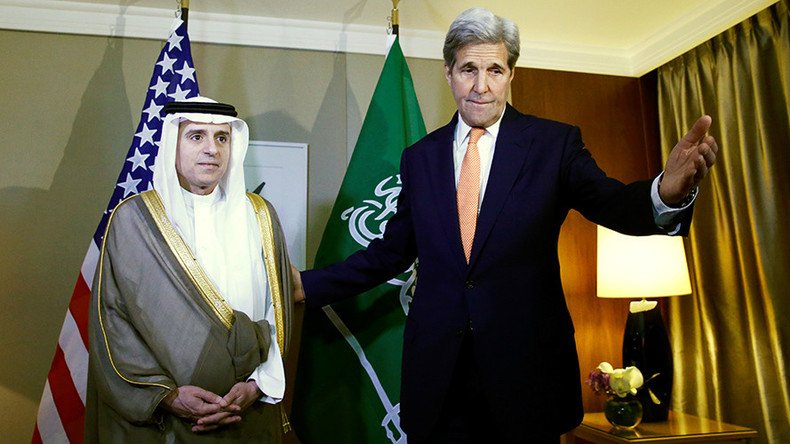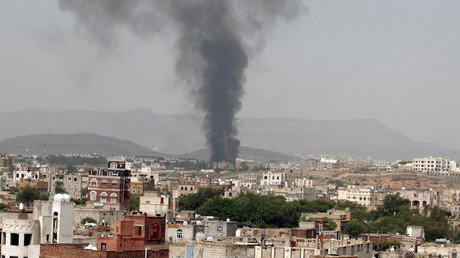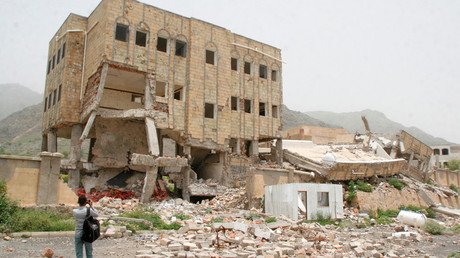US, Saudi Arabia reveal new plan to end Yemen conflict

Secretary of State John Kerry has revealed a plan to restart talks to end the ongoing civil war in Yemen with help from Saudi Arabia. He also announced an aid package to the war-torn country, where thousands of civilians have died in Saudi-led bombings.
The announcement of the new peace plan and the humanitarian assistance came the same day that a UN report found that airstrikes carried out by the Saudi-led coalition in Yemen are responsible for the majority of civilians killed in the country’s civil war.
Kerry was in Saudi Arabia, where he met with Foreign Affairs Minister Adel al-Jubeir to discuss the 18-month conflict between the Houthi rebels and the internationally recognized government that has been exiled to Saudi Arabia. Previous UN-sponsored negotiations to end the war in Yemen fell apart earlier this month.
"We agreed on a renewed approach to negotiations with both a security and political track simultaneously working in order to provide a comprehensive settlement," Kerry said during a press conference. "The final agreement... would include in the first phase a swift formation of a new national unity government, the withdrawal of forces from Sanaa and other areas and the transfer of all heavy weapons including ballistic missiles, from the Houthis and forces aligned to them to a third party."
The negotiations on how to bring the Houthis to the table, called the Quad discussion, took place between the US, Saudi Arabia, the United Arab Emirates and the UK on Thursday. Kerry and al-Jubeir then met with their counterparts from the Gulf Cooperation Council ‒ which includes the UAE, Oman, Kuwait, Qatar, Bahrain and the UK ‒ to get the approval of its members on the new approach. The Houthis, a movement of religious minority Shia Muslims that has the support of many Yemenis, were not involved, nor were there any representatives from the exiled Yemen government.
“We were able to come out with a vision regarding the roadmap to Yemen,” al-Jubeir said, speaking through an interpreter. “We have all offered our full support to these efforts and we expressed our hope that the Yemeni parties can resume negotiations and talks and arrive at a peaceful solution that would lead to – that would end the war and transform Yemen from the war and destruction to restruction and stability.”
Tensions in Yemen escalated after Shia President Ali Abdullah Saleh was deposed in 2012 and his Houthi supporters – reportedly aided by Iran – eventually seized the capital city of Sanaa in 2014. Houthi forces then advanced from Sanaa towards the south, seizing large parts of Yemen and sending current Sunni President Abd-Rabbu Mansour Hadi into exile.
Last March, a Saudi-led coalition began airstrikes in order to stop Houthi advances and reinstate Hadi to power. By late summer 2015, Saudi-led forces had launched a ground operation as well. In response, Houthis began shelling across the border into Saudi Arabia. The most recent Saudi attack came Saturday, when jets struck Sanaa during a rally attended by some 100,000 pro-Houthi rebels and Saleh sympathizers.
Kerry’s trip comes amid growing pressure on the Obama administration to cut back its support to Saudi Arabia. A bipartisan group of senators is moving to block a $1.15 billion sale of US tanks to the kingdom, citing concerns over human rights and the Saudi-led war in Yemen. Human Rights Watch and the New York Times editorial board have both come out against the sale. Last Thursday, Doctors Without Borders (Medecins Sans Frontieres or MSF) evacuated its staff from six hospitals in Yemen due to frequently occurring “indiscriminate shelling” by the Saudi-led coalition. On August 15, an airstrike on a MSF facility killed 19 people and injured 24.
#Yemen We withdraw our teams due to indiscrimate bombings and unreliable reassurances from Saudi led coalition https://t.co/IbCV57t55O
— MSF International (@MSF) August 18, 2016
During the press conference, however, Kerry did not mention those concerns. Instead, he called on the Houthis to stop shelling Saudi Arabia, pull back from Sanaa and transfer their weapons to a third party in exchange for their inclusion in a unity government. However, Kerry stopped short of asking the rebels to meet those requirements before the formation of the new government, a key demand of the exiled politicians.
"This leaves nothing for future speculation," Kerry said. "This has a clarity to it about how confidence can be built, what the end game looks like, and how the parties get there."
The secretary of state also criticized the international response to the crisis in Yemen.
“I have to say that, to date, the international response to this crisis has fallen short of filling the gap between the supplies that are available and those that are required,” Kerry said before announcing nearly $189 million in additional humanitarian assistance. That brings the total US humanitarian aid package to Yemen to more than $327 million in fiscal year 2016, the State Department said.
More than 3.1 million Yemenis have been displaced since the civil war broke out in March 2015, and more than 80 percent of the country’s population (21 million people) are in need of humanitarian assistance, while seven in 10 Yemenis need emergency food supplies, according to the Famine Early Warning Systems Network, an agency funded by the US Agency for International Development (USAID). An estimated 3,800 civilians have been killed since the Saudi-led airstrikes began. The UN’s Office of the High Commissioner for Human Rights estimates that at least 9,000 people have died overall, and another 6,711 people have been wounded in the conflict.
GRAPHIC: At least 10 children killed in Yemen after school reportedly hit in airstrikehttps://t.co/PCVXucHdOb
— RT (@RT_com) August 14, 2016
The new funding will cover food and nutrition assistance to help those suffering from moderate to severe malnutrition, emergency health care, hygiene kits, psychosocial support, and access to safe drinking water and sanitation. It will also provide critical protection, shelter and other assistance for Yemeni refugees in the Horn of Africa. The money will be disbursed through the UN and non-governmental organizations.
The US also seeks to improve the capacity of the Hudaydah Port so it can receive humanitarian and commercial supplies.














